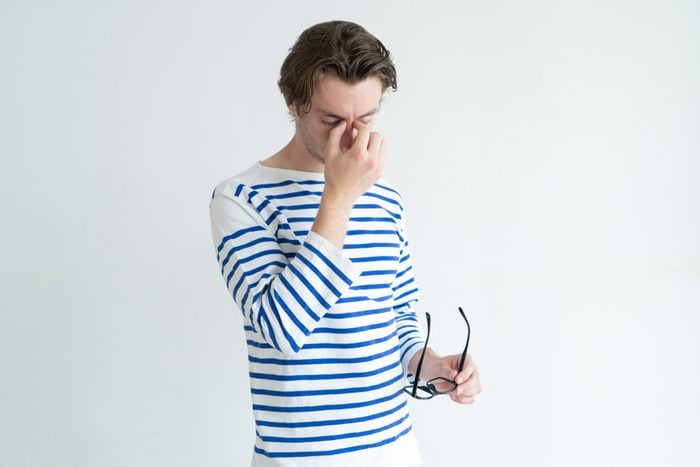
“Me,” “myself,” and “I”
Depression can turn a person’s focus inward. People with depressive symptoms tend to use more first-person pronouns, revealing an increase in self-focused attention, according to a study that looked at online forums, published in Clinical Psychological Science. “The experience of depression is one where you feel things intensely, so talking in the first person, using me, I, myself, is a common experience,” says psychologist Deborah Serani, psychologist and author of Living with Depression. “Depressed children and adults tend to be introspective because the illness seizes the mind and body in ways that heighten self-awareness. However, this self-awareness isn’t positive; instead, it’s negative and corrosive.” Would you pick up on such subtle clues? Take this quiz to see if you could recognize depression symptoms.
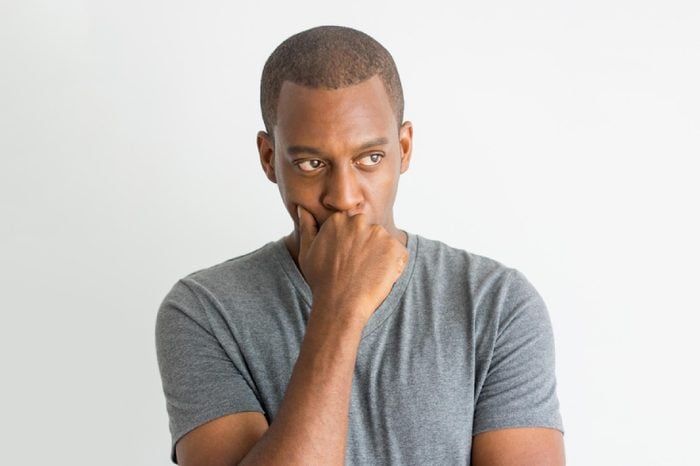
“Always” and “never”
The study also found that people with symptoms of depression tended to talk in absolutist language. Depression frequently leads to distortions in thought patterns (called cognitive distortions) which affect how we feel. Black-and-white thinking is a common distorted thought pattern linked with depression. So, if you hear a friend repeatedly saying things like, “This always happens” or “I’m never going to be able to do this,” take note. Everyone uses these kinds of phrases from time to time but people with depression use them more often as a pattern of language. “The frontal lobes of the brain are negatively affected when depression occurs, so judgment, thinking, and reasoning are impaired, which can lead to all-or-nothing thinking,” Serani says. “Once the symptoms of depression reduce and recovery occurs, most depressed individuals have a greater range of solutions, a solid sense of judgment, and less rigid thinking.” Keep an eye out for these hidden signs of depression.

“I should…”
Focusing on what you “should” be doing is part of the black-and-white thinking that comes with depression when reflecting on yourself and your life. “Thoughts of self-loathing and a negative self-image often occur in depression, so the ‘shoulds’ are a symptom of this narrowed and rigid kind of thinking,” Serani says. People with depression get “stuck” on negative thoughts and have a hard time switching their thoughts in a more positive direction, according to research published by the Association for Psychological Science. In a vicious cycle, feeling that you “should” be doing or feeling something different makes you even more depressed. This is what psychologists wish people knew about depression.

Negative emotion words
People with depression might not be able to identify it by name—one study of teens found that they rarely used the word “depressed” when describing their feelings, but instead used other negative emotion words like “down,” “stressed,” or “upset.” Although this may seem an obvious red flag, we all use these words occasionally. So, the key is to recognize a pattern over time. “I have heard many words from children and adults who are depressed, including bad, sad, helpless, hopeless, aching, lost, worthless, useless, stupid, stuck, untethered, adrift, hurting, alone, afraid, unsure, insecure, despair, black and blue, just to name a few,” Serani says. “Often these words are expressed about themselves or about how they feel.” Sound familiar? Be alert to the silent signs you may need depression medication.
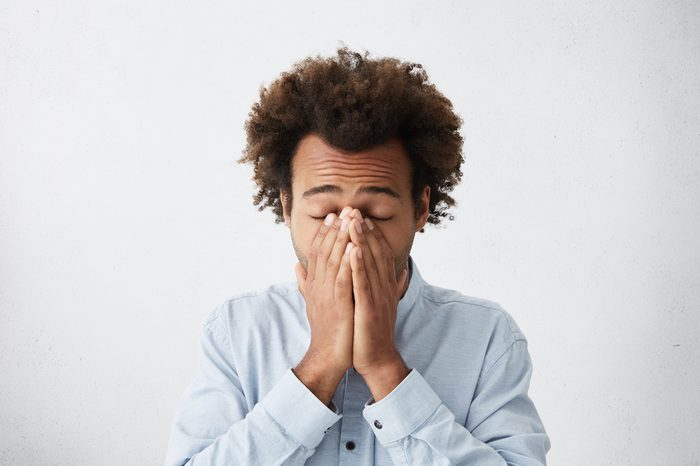
“I can’t…”
This one is tricky because people with depression often literally can’t get out of bed or can’t get themselves dressed—and they certainly can’t just snap out of it. Not being able to perform daily activities is one of the classic symptoms of depression, according to the National Institute of Mental Health (NIMH), so use of “can’t” may just be stating what’s going on. But, it also is part of a negative use of language reflecting that “stuck” feeling of depression. “A lot of depressed individuals also use the word ‘can’t’ a lot as in I can’t do this, I can’t get this done, I can’t feel better, I can’t get my work done, I can’t get out of bed, I can’t get things to be good,” Serani says. “The illness of depression has foreclosed the possibility of many, many things.” These depression quotes capture exactly what it feels like to be depressed.

“It’s all my fault”
Depression brings huge amounts of guilt and self-blame, part of the overgeneralized, all-or-nothing feelings that depressed people are prone to. “Depression creates a pattern of negative thinking because the illness impairs frontal lobe functioning, where reasoning and judgment take place, so many depressed people feel guilty about the way they feel,” says Serani. One study, published in the Archives of General Psychiatry, used MRI scans to show how feelings of guilt in people with depression actually activate the brain differently than in people without depression. Such self-blame can be dangerous because if people think “they’re a burden, or too much to handle for family and loved ones, suicidal thinking can take over: ‘If I’m gone, I won’t be a burden to anyone anymore,'” Dr. Serani says. “This negative kind of thinking is vital to take note of.” This test on Google is for you if you think you might be depressed or mentally ill.
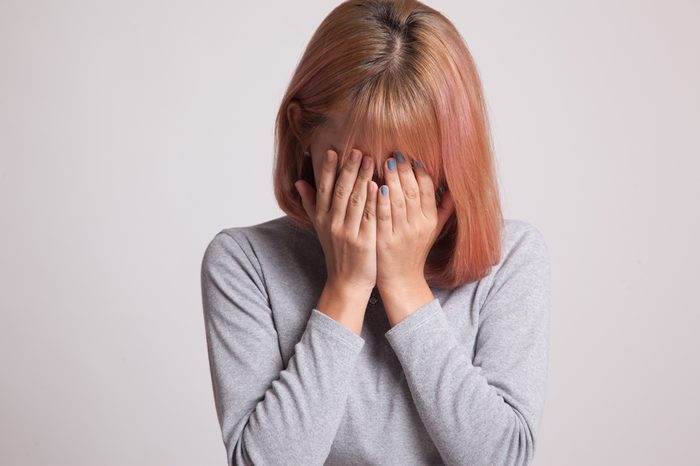
“I’m fine”
You’re coping—you think—but it could be one of the signs that you have high-functioning depression. Research has found widespread stigma in the United States still prevents many people from getting help for mental illness. “Judgment is impaired with depression, so asking for help or sharing what one truly is feeling may not occur,” Serani says. “Some may find the stigma of having a mental illness too shameful to deal with, and many will wear a smile on their face instead of revealing their enormous pain.” Others may feel too weak or vulnerable to ask for help, she says.
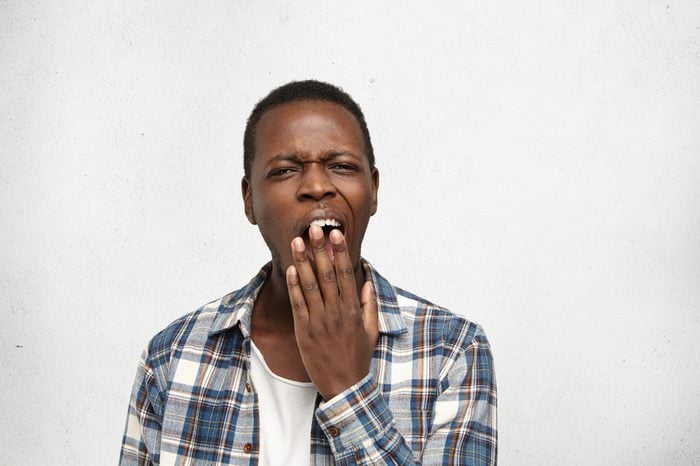
“I’m tired”
With depression, physical and emotional symptoms may coincide. “Fatigue and aches and pain are related to the inflammation that comes with depression because it affects neural pathways and neurochemicals,” Dr. Serani says. “I remember when I had my first major depressive episode at age 19, I was so exhausted,” Serani says. “It took such effort for me to turn from one side of the bed to the other, never mind get out of bed, shower, eat, or tend to daily things.” Tiredness is felt both literally and figuratively with depression, so people suffering from it may also express a feeling of emotional tiredness, such as, “I’m so tired of dealing with this.”
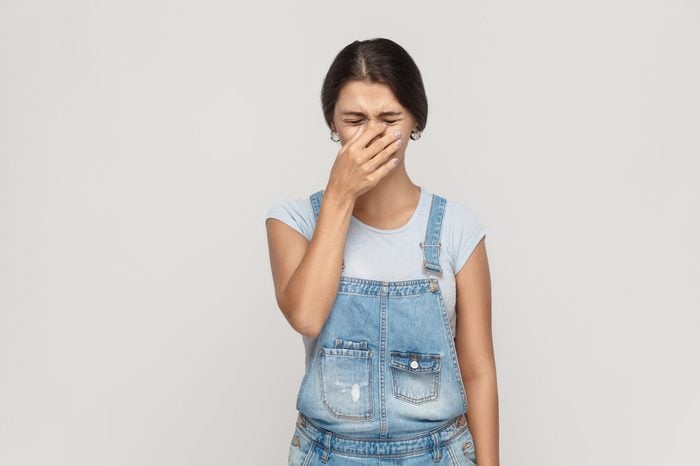
“I want to be alone”
People with depression may start to withdraw and isolate themselves, Serani says, as those negative feelings take their toll on the brain. “The neurobiology of depression reduces an enormous amount of brain activity, so a depressed person will likely stay out of stimulating experiences, preferring darker rooms, quiet settings, and being away from others,” she says. Ironically, “the very thing they need is to be connected, to be in the sun and light and have their senses fed by not being away from others,” Serani adds. Interestingly, staying connected online is not the same: Heavy social media use is actually linked to depression in young people, according to a study published in Computers in Human Behavior. Find out more everyday habits that could increase your risk of depression.

“No one cares”
It’s not just the isolation itself that’s harmful—it’s the feeling of loneliness, research has found. Perceived social isolation can lead to thoughts that others don’t value you and don’t care if you’re there or not, which validates your own feelings of self-worthlessness and draws you further down the dark path of depression. Plus, feeling alone can make you think no one is there to help you. “Helplessness is another symptom of depression,” Serani says. “Depressed children and adults experience a tunnel vision when it comes holding onto hope for the future—again, the frontal lobes of the brain are restricting problem-solving and reasonable judgment.” Here are ways you can help someone with depression, according to psychologists.

“I don’t feel like it”
Another aspect of withdrawal in depression is losing interest in things you used to find pleasure in. People with depression might say, “It’s not fun anymore,” or that they just don’t feel like engaging in a once-preferred activity. “The psycho-emotional aspects of depression reduce feelings of happiness and joy, so not wanting to do things and losing interest in activities that were meaningful are hallmark signs of depression,” Serani says. “Depression is an illness of depletion—its symptoms siphon off all that is good, sound, happy, and possible in a person.” Some research suggests this numbing feeling is due to a dysfunction in the brain’s “reward system,” which prevents feel-good chemicals from being released. That’s why if you know someone with depression, the last thing you want to say is to “cheer up.” These are the other things to never say to someone with depression.

“What’s the point?”
Depression is so deadly because all of these feelings can become overwhelming and make you want to give up. The condition is one of the biggest risk factors for suicide, according to the Centers for Disease Control. “If you think there is no way to feel better, and nothing can change, you want it to end,” Serani says. “So, you believe that death is the way to make things better.” People who express a pointlessness to life, wanting things to be “over,” feeling trapped, that they “can’t go on,” or have a preoccupation with death may be in the midst of thinking about suicide. If you or a loved one have been talking this way, call the National Suicide Prevention Lifeline at 1-800-273-8255, because help is available. “Depressed individuals who’ve gotten treatment and recovered can’t believe they ever wanted to end their lives,” Serani says. This teenager said this one thing stopped a total stranger from committing suicide.

“I feel better”
This is one of the most dangerous misconceptions about depression. Ironically, once a depressed person has made the decision to end their life, they sometimes suddenly express feeling better, calmer, or more at peace. “Studies have taught us that a ‘flight into health,’ in which a person claims to be feeling better, can be a distraction method that implies suicide is imminent,” Serani says. Even if you think a loved one is improving, you still need a doctor to evaluate them. “Anyone who is depressed needs to have professional treatment to assess recovery every step of the way to ensure its positive trajectory,” Serani says. Here are more suicide warning signs that are easy to miss.

